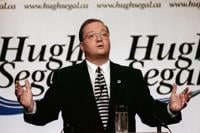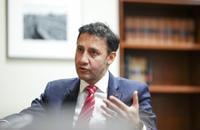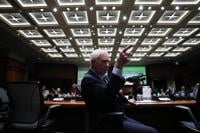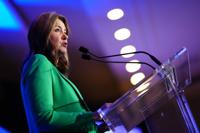OTTAWA - In 1962, then-prime minister John Diefenbaker visited Hugh Segal's school in Montreal to present the principal with a copy of the newly minted Canadian Bill of Rights.
So impressed was Segal with Dief's description of Canada as a country that was open, free, democratic and based on the presumption of innocence that, at the tender age of 12, he became a lifelong Conservative.
"I went home on that Friday night and declared at the dinner table that I like Mr. Diefenbaker and I would be supporting his candidate in the local riding of Mount Royal," Segal recounted in a speech to the Senate in 2013.
"That was not a happy bit of news for me to bring to the Friday night table in our home. My father (a Liberal campaign manager) said those wonderful words which every pre-teen waits for: 'Over my dead body' ... It got me excited because I knew there was one thing I could do that would upset him all the time."
It was a pattern Segal was to repeat throughout his life, which came to an end Wednesday evening in Kingston, Ont.,at the age of 72. He would remain a Conservative loyalist, an ardent defender of civil liberties and he would never be afraid to stand up for what he believed, even when it infuriated other members of his political family.
Never were those qualities more evident than during the 2013 scandal involving allegedly dodgy expense claims made by three Conservative senators: Mike Duffy, Pamela Wallin and Patrick Brazeau.
In the midst of police investigations, opposition uproar and a full-scale media feeding frenzy, Conservatives, desperate to put distance between themselves and the tainted trio, moved to suspend them without pay from the Senate. Segal was the only Conservative senator to vote against the suspensions, although several others had qualms and abstained.
"It is one thing to wonder whether we manage our expenses properly ... It is another to question whether we understand the premise of fairness, the premise of due process, the premise of presumption of innocence because, if we convey through action on these motions that we in fact do not, then I suggest we will have created a far more serious problem for this institution than it now has," Segal said in a speech urging senators to vote against the suspension motions.
It was in that same speech that Segal recounted the youthful encounter with Diefenbaker that prompted him to become a Conservative.
He tried to remind his fellow Conservatives of their party's proud history defending civil liberties by recounting some of his own storied history with the party: running unsuccessfully for election under one-time federal Conservative leader Robert Stanfield, who supported official bilingualism when it was profoundly unpopular among party rank and file; his time as chief of staff for Ontario premier Bill Davis, who created a human rights code that recognized some rights of gay Ontarians for the first time and who was instrumental in enshrining the Charter of Rights and Freedoms in Canada's Constitution; and his time as chief of staff to prime minister Brian Mulroney, who stood up for francophones in Manitoba and campaigned against apartheid in South Africa despite pressure from British PM Margaret Thatcher and U.S. President Ronald Reagan to back off.
Segal's appeal landed on deaf ears. Duffy, Wallin and Brazeau were suspended without pay for two years. Duffy was eventually acquitted on charges of fraud, bribery and breach of trust, after which police dropped charges against Brazeau and closed the investigation into Wallin, who was never charged.
By that time, Segal had retired early from the Senate to become the master of Massey College at the University of Toronto. From that academic perch, he openly urged his former Senate colleagues to formally apologize to Duffy, Wallin and Brazeau and reimburse them for their lost income and legal fees — an appeal that also fell on deaf ears.
That entire episode was the quintessential Segal, according to his close friend and one-time business partner Bill Fox, with whom Segal founded one of Ottawa's premier government relations firms, Earnscliffe Strategy Group, in 1989, along with fellow Mulroney-era Conservative insider Harry Near and Liberal Mike Robinson.
"I always come back to that stand in the Senate. I just think, you want to know about this man? To me, that tells you everything you have to know about him," said Fox.
There were a few other senators "standing on the shore" hoping Duffy, Wallin and Brazeau wouldn't drown "but they weren't going into the water to help you," he added. "Hughie went into the water to help."
For any "normal human being," taking a stand against such an overwhelming tide of censure against the three disgraced senators would take a lot courage, Wallin reflected. "But I don't think it's a question of courage on the part of Hugh to stand up and give that speech ... It is who he is ... This is a man of principle in the truest sense.
"He is the most human and humane and the most generous person I've ever met, really and truly," she added. "Generous of spirit, of time, of heart, of caring. You want to be Hugh's friend because when you need a friend there just is no one better."
Wallin became friends with Segal decades earlier when she was host of CTV's Canada A.M. and he was part of the country's first television political panel, along with Liberal Michael Kirby and New Democrat Gerald Caplan. While the three men often disagreed vehemently on issues, she said they became good friends and never indulged in cheap shots or personal attacks.
Segal could play political hardball, she said, but he was always respectful.
"He would never say anything about someone that he wouldn't say to someone" — perhaps the legacy of his days with mentors like Bill Davis who practised a "kinder, gentler" style of politics, said Wallin.
He was also a Progressive Conservative — and a red Tory at that, tilting more to the progressive part of the party's name — and that, Wallin noted, was a different animal than the harder-edged, more right-wing Conservative party he eventually represented in the Senate after the merger of the PCs with the Canadian Alliance.
Mulroney said Segal brought "a cool head in some pretty tense situations" and an unshakable sense of his principles.
"Hugh was a loyal, delightful, warm, affectionate, reasonable guy, who brought a great deal to the decision-making process of my government," the former prime minister said in an interview on Thursday.
"His service to Canada was truly outstanding, and those of us who worked with him came to love him and will miss him terribly."
Mulroney is among those who describe Segal as the proverbial "happy warrior" — an apt description for someone Fox said was so "affable and friendly and genuinely funny" that people often overlooked the "warrior" part of the sobriquet.
But there's no question he was both happy and a warrior.
Indeed, at numerous junctures, Segal seemed to be at war with his own party, to which he frequently gave unsolicited, public advice. Among the many thoughtful books he wrote was The Right Balance in 2011, in which he argued that modern conservatism needed to adopt a "political system of beliefs in which fairness and compassion are not threatening to enterprise, profit, growth or freedom."
About six months before the 2019 election, when Justin Trudeau's Liberal government was engulfed in a scandal over alleged interference in the justice system to help Montreal engineering giant SNC-Lavalin, Segal penned an op-ed warning Conservatives they'd hurt their chances of forming government if they continued blindly opposing every Liberal move and stoking revulsion at alleged government improprieties, rather than offering fresh, positive, nation-building proposals of their own.
"The lure of dog whistle politics (decrying asylum seekers arriving through non-official border entries and knowing this will attract the anti-immigration and anti-diversity vote; or declining to support statutory reform of the Senate while hoping not to get caught campaigning for the 'all partisan all the time' Senate of yore) may work for a moment in time. But the conservatism of anger, resentment, turning back the clock, ignoring legitimate constitutional and self-government rights of First Nations, have rarely in Canadian politics won elections," he wrote.
A lifelong advocate of a guaranteed, universal, basic income, Segal was unstinting in his condemnation of Doug Ford's newly minted Progressive Conservative government in Ontario when in 2018 it scrapped a basic income pilot project that Segal had helped design. He called the decision "horrific."
"I am embarrassed as a Progressive Conservative," he told CBC Radio, adding that social justice and equality of opportunity — traditional hallmarks of progressive conservatism — is clearly "of no value to this government."
While he was considered an astute political strategist, Segal was never able to get himself elected. He ran twice to become the member of Parliament for Ottawa Centre and failed both times. In 1998, he ran for the leadership of the federal Progressive Conservatives, placing a distant second on the first ballot, after which he threw his support to the eventual winner, Joe Clark, who took the helm for the second time.
Between his roles on the Hill, Segal led the Institute for Research on Public Policy, up until his appointment for the Senate. The think tank praised him Thursday for his "contagious enthusiasm around public policy issues" that spanned the function of the civil service to the role of military allies.
Segal was married to Donna Armstrong Segal, with whom he had one daughter, Jacqueline.
He died surrounded by family, who wrote in a statement that they were "deeply touched" by condolences from across the partisan spectrum.
"We take comfort in your stories of his service to Canada and all Canadians, his commitment to decency in our politics and his laugh," they wrote. "We thank you for loving Hugh as much as we do."
This report by Ďă¸ŰÁůşĎ˛ĘąŇĹĆ×ĘÁĎ was first published Aug. 10, 2023.








































